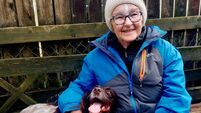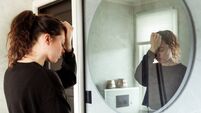Fit Focus: Look after your bone health as you age

Osteoporosis is a weakening of the bones
AS we age, but particularly more so women who have had children, tend to develop osteoporosis.
Osteoporosis is a weakening of the bones, they become more porous and the risk of breaks and fractures are higher.
It is really important and is becoming much more accepted now and monitored but where should you start if you are in your 40s or older and want to look after your bone health as you age?
The first thing that you should do is make an appointment with your doctor and get a full health check, blood panel along with trying to organise a dexa scan. Then you have a starting point to see exactly where you are starting from. You can refer back to this and monitor your progress because if you are not testing then you are guessing and guessing is not good enough when it comes to your health. You need to be in full control of your health and the direction it is going in.
The next step that you should do is make sure you are getting in adequate levels of protein in your diet. This is lean protein not a source of protein rich food, for example a 100 gram chicken fillet will have around 28 grams of protein and a 100g portion of salmon will have 22 grams of protein. You should aim to have 90 – 120 grams of protein in your diet every day.
I regularly see this particularly with my female clients when you discuss protein on a daily basis and they are completely unaware of how deficient they are with protein levels. A good way to start is to use a free food tracking app to measure your macro nutrient breakdown and actually see how much protein that you are consuming on an average day.
The second thing is to make sure you are getting adequate sleep. Hormones can play havoc with your sleep patterns depending on your age but developing good sleep hygiene habits such as eliminating screens an hour before bed, making sure your bedroom is cool, going to bed at the same time consistently and not eating 3-4 hours before going to bed. This will all have positive effects on your sleep along with practicing breathing exercises. There are many guided meditations and breathe exercise videos that are free on YouTube that will help calm the nervous system before bed and again if you wake during the night.
Supplements are also important but not all supplements are created equally. If you can find supplements that use liposomal technology these are the best for absorption. But a basic starting pack of supplements would be a D3+K2 supplement, magnesium, a B complex will help with sleep and collagen is also a really good one to add to the list.
It is important to remember though that these are all just supplements and they are not going to substitute for a poor diet. The first and most important thing is to develop really good eating habits.
Start by eliminating refined carbohydrates, eliminate vegetable and seed oils and reduce sugar. Refined carbohydrates and vegetable seed oils create a toxic environment in your body that is pro-inflammatory and directly attacks your overall health.
Adding a routine of strength training to your schedule is hugely beneficial as well and I have seen clients improve their dexa scan score within six months of consistent strength training two-three times a week.
Strength training should not be confused with high intensity training and running is also not a substitute. Strength training using bodyweight and free weight exercises are the best exercises to improve bone density and strength. If you are unfamiliar with what to do in the gym then it is very important that you liaise with a trainer to get their support and guidance to make sure you are getting the full benefit of your resistance training routine.





